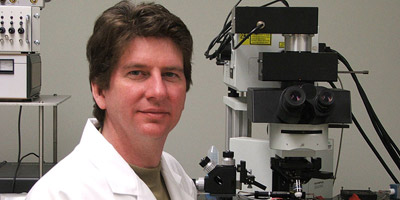
BIRMINGHAM, Ala. - The University of Alabama at Birmingham (UAB) and the McKnight Brain Research Foundation, of Orlando, Fla., are establishing a $10 million endowment for the Evelyn F. McKnight Brain Institute at UAB to support the institute and the Evelyn F. McKnight Endowed Chair for Learning and Memory in Aging. The endowment is made possible by a $5 million gift from the McKnight Brain Research Foundation and a $5 million matching contribution from UAB and other donors.
"This generous gift from the McKnight Foundation will enable the institute and the endowed chair to exist in perpetuity at UAB," said Robert Rich, M.D., senior vice president and dean of the UAB School of Medicine. "We are incredibly indebted to the trustees of the foundation for their investment in UAB's research to better understand age-related memory loss."
The institute was established at UAB with an initial $5 million gift from the McKnight Brain Research Foundation in 2004, followed by an additional $1 million in November 2005. The total amount of the new gift is $6 million, including $5 million for the endowment and an additional $1 million for operational funding, also to be matched by UAB.
David Sweatt, Ph.D., the chair of UAB's Department of Neurobiology, is the director of the institute and holder of the Evelyn F. McKnight Endowed Chair. The institute occupies 75,000 square feet of research space on three floors of the Richard C. and Annette N. Shelby Interdisciplinary Biomedical Research Building.
Sweatt's research focuses on molecular mechanisms underlying learning and memory. His laboratory uses genetically engineered animal models for human learning and memory disorders to investigate the molecular and cellular basis of human memory dysfunction. His laboratory has discovered a number of new roles and mechanisms of gene regulation in memory formation, focusing on studies of transcription factors, regulators of chromatin structure and other epigenetic mechanisms such as chemical modification of DNA.
Sweatt and colleagues are using what they have learned about the molecular basis of memory formation to generate new treatments for humans with learning disabilities and aging-related memory dysfunction.
Established in 1999 by Evelyn Franks McKnight, the McKnight Brain Research Foundation supports research toward the understanding of memory and the specific influences of aging on memory. Evelyn and William L. McKnight, who was employed by the Minnesota Mining & Manufacturing (3M) Corporation for 59 years and served as either president or chairman of the board for 37 years prior to his retirement in 1966, were particularly interested in the effects of aging on memory.
McKnight, who was a nurse, shared her husband's belief that research is the key to tomorrow. The gifts provide for faculty salaries, purchase of laboratory instrumentation, pilot research funding and other scholarly activities.
About the McKnight Brain Research Foundation
The purpose of the McKnight Brain Research Foundation is to promote research and investigation of the brain in the fundamental mechanisms that underlie the neurobiology of memory with clinical relevance to the problems of age-related memory loss.
About UAB
Known for its innovative and interdisciplinary approach to education at both the graduate and undergraduate levels, the University of Alabama at Birmingham (UAB) is an internationally renowned research university and academic medical center whose professional schools and specialty patient care programs are consistently ranked as among the nation's top 50; find more information at www.uab.edu and www.uabmedicine.org.